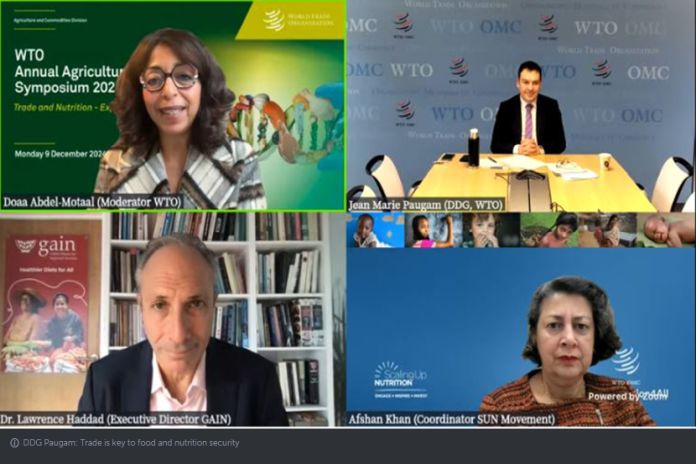![]() GENEVA, Switzerland – Speaking on behalf of director-general Ngozi Okonjo-Iweala at a virtual agriculture symposium on food and nutrition security organized by the World Trade Organisation (WTO) on 9 December, deputy director-general Jean-Marie Paugam underscored the critical role of open trade in achieving food and nutrition security.
GENEVA, Switzerland – Speaking on behalf of director-general Ngozi Okonjo-Iweala at a virtual agriculture symposium on food and nutrition security organized by the World Trade Organisation (WTO) on 9 December, deputy director-general Jean-Marie Paugam underscored the critical role of open trade in achieving food and nutrition security.
DDG Paugam emphasized that WTO rules are essential for facilitating the exchange of food and ensuring positive nutrition outcomes globally. He also stressed the importance of updating the WTO rulebook, noting “director general Okonjo-Iweala stated last week that agricultural negotiations are a top priority of her second term.”
Noting the intricate relationship between food and nutrition issues, DDG Paugam kicked off the symposium by stating that having enough food is as important as having good-quality food.
DDG Paugam stated: “The first and most important contribution of trade to food security is in the sense of security of supply. World trade in food is essential for many countries and people,” and noted that many could face starvation if international food trade were to cease. Currently, 25 percent of global food production is traded internationally, and the value of food and agricultural trade has reached USD 2.3 trillion.
DDG Paugam emphasized the growing role of trade in improving food and nutrition diversity. In 2010, diversity of products available for consumption globally was almost 60 percent higher than that produced domestically. “By 2020, this figure had risen to nearly 90 percent, demonstrating how trade has significantly increased the variety of foods available for consumption.” He also highlighted the increasing complexity and interconnection of the global food supply chain as processed food has become the fastest-growing sector in world food trade.
According to the UN Food and Agriculture Organization, one-third of global food and agricultural exports now cross international borders at least twice. DDG Paugam stressed the need to leverage trade policies to protect this interconnectedness for the sake of better food and nutrition security.
Outlining key priorities for the WTO to achieve this goal, DDG Paugam first called for progress in the ongoing agricultural negotiations at the WTO to address trade barriers, including high agricultural tariffs, substantial trade-distorting subsidies, and the environmental challenges exacerbated by current farming practices.
DDG Paugam said: “The WTO has to contribute through agricultural reform to remove and reform those negative incentives while taking into account both the specific needs of developing countries and the specific tools, like public food stockholding programmes, that may be needed to contribute to food security.”
Second, DDG Paugam reiterated the role of the multilateral trading system in contributing to curb the food export restrictions that are not absolutely necessary, noting that such restrictions can be counterproductive when they create artificial scarcity, driving up global food prices.
Laying out recommendations for governments to deliver better food and nutrition outcomes, DDG Paugam indicated that trade policy should be used to open up trade and expand nutritional choices for consumers. He cited examples from several countries that have reduced tariffs on nutritious foods, issued health warnings on the sugar, salt and fat content of foods, and implemented nutrition labelling.
DDG Paugam highlighted specific WTO agreements that support positive nutrition outcomes, particularly the Agreement on Sanitary and Phytosanitary Measures and the Agreement on Technical Barriers to Trade, which enable safe food imports and promote the use of nutrition and warning labels to enhance consumer awareness.
“I encourage WTO members not only to contribute positively to the agricultural negotiations but also to advance the nutrition agenda by continuing to discuss the regulatory dimension of international trade,” DDG Paugam concluded.
This year’s annual agriculture symposium aimed to explore the critical intersections between global trade policies, food systems and nutritional outcomes. The event brought together policymakers, the business community, researchers and stakeholders to discuss strategies for leveraging trade to promote food security and healthy diets. It examined how international trade affects access to affordable, nutritious foods, particularly in low-income countries, and how global supply chains can be adapted to meet the nutritional needs of a growing global population.
The full programme of the symposium is available here. The event can be viewed here.





